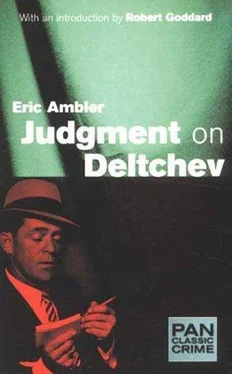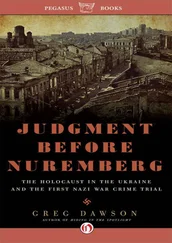Eric Ambler - Judgment on Deltchev
Здесь есть возможность читать онлайн «Eric Ambler - Judgment on Deltchev» весь текст электронной книги совершенно бесплатно (целиком полную версию без сокращений). В некоторых случаях можно слушать аудио, скачать через торрент в формате fb2 и присутствует краткое содержание. Год выпуска: 1977, ISBN: 1977, Издательство: Vintage, Жанр: Криминальный детектив, на английском языке. Описание произведения, (предисловие) а так же отзывы посетителей доступны на портале библиотеки ЛибКат.
- Название:Judgment on Deltchev
- Автор:
- Издательство:Vintage
- Жанр:
- Год:1977
- ISBN:9780307049971
- Рейтинг книги:4 / 5. Голосов: 1
-
Избранное:Добавить в избранное
- Отзывы:
-
Ваша оценка:
- 80
- 1
- 2
- 3
- 4
- 5
Judgment on Deltchev: краткое содержание, описание и аннотация
Предлагаем к чтению аннотацию, описание, краткое содержание или предисловие (зависит от того, что написал сам автор книги «Judgment on Deltchev»). Если вы не нашли необходимую информацию о книге — напишите в комментариях, мы постараемся отыскать её.
Judgment on Deltchev — читать онлайн бесплатно полную книгу (весь текст) целиком
Ниже представлен текст книги, разбитый по страницам. Система сохранения места последней прочитанной страницы, позволяет с удобством читать онлайн бесплатно книгу «Judgment on Deltchev», без необходимости каждый раз заново искать на чём Вы остановились. Поставьте закладку, и сможете в любой момент перейти на страницу, на которой закончили чтение.
Интервал:
Закладка:
‘Another drink?’
‘For God’s sake, yes.’ He leaned forward, his face slightly flushed, his lips still wet with brandy. ‘How does one deal with it, Foster?’
‘Brankovitch’s press conference?’ I signalled to the waiter.
‘All of it. The whole phoney business. Perhaps it’s all right for you. You’ve got plenty of time. A series of articles, weeks hence. But I’m supposed to be sending news. All I’ve got through so far are those damned official bulletins. I suppose Pashik sends those to your people?’
‘Yes.’
‘Do you know what I’d like to do?’ His dull, hot eyes brooded on mine.
‘No, what?’
‘I’d like to put it across them. I’d like to split the whole damn business wide open.’ He frowned suddenly as if with irritation at himself. ‘Take no notice. I had drinks before the party.’ He smiled slyly and lowered his voice. ‘Can you keep a secret, Foster?’
‘Yes.’
‘The funny thing is I can do it.’
‘Do what?’
‘What I said — break it open.’ He looked round cautiously and leaned farther forward. ‘I’ve found a way round this bloody censorship.’
‘Oh, yes?’ My heart began to beat rather unpleasantly.
‘I can’t tell you the details because I swore not to, but there’s a little man in the Propaganda Ministry who doesn’t like the regime any more than we do and he’ll play. Of course, if he was found out he’d be lucky if they hanged him quickly, but he’s prepared to take the risk. There’s only one snag.’ He paused. I waited. ‘He can’t do it more than once and the deadline’s tomorrow.’
‘That should give you time.’
‘It’s a risk.’ He frowned at the table as the waiter put fresh drinks down. ‘A big risk. If I’m caught, I’m out. Of course, that wouldn’t matter to you. It’s not your living. But, by God, it’s a risk I’d like to take.’
‘The little man in the Propaganda Ministry must think it worth while.’
He laughed shortly. ‘You’re right. It’s funny, isn’t it? One minute I’m breathing fire and murder, and the next I’m worrying about a little risk.’ He laughed again. His performance was deteriorating rapidly. I was not helping him and he would have to come to the point himself. I waited, fascinated.
‘Would you take the risk?’ he asked suddenly.
‘I don’t know. The question would have to arise.’
‘All right, supposing’ — I thought I detected a note of genuine exasperation in his voice — ‘just supposing you had a chance to file a short message with mine. Would you take it?’
‘Is that an offer?’
‘Don’t be silly. Why should I give you a beat?’
‘I don’t know. Why should you?’
‘You’d have to make it worth my while.’
‘What’s that mean?’
He did not answer. He was pretending to debate with himself. ‘Look, Foster,’ he said then, ‘let’s be serious for a moment. If I’d thought you were going to fasten onto the thing like this, I tell you frankly I wouldn’t have mentioned it.’ He paused. ‘But since I have, I tell you what I’ll do. If you’ll undertake to confine your message to pure comment on the trial as a whole, I’ll get it through with mine.’
‘If you do send one, of course.’
‘Oh, I’m going to send it all right. Don’t you worry. And now you can buy me another drink.’ He sat back with a tremendous air of having sold his birthright. ‘I make only one stipulation. I’ll have to read your stuff before I pass it on. Honestly, I wouldn’t trust my own brother in a thing like this. Right?’
‘I understand.’ To give myself time to think I looked round for the waiter. I had had it all now: the confidence-promoting diatribe against the regime, the brandy-laden indiscretion, the indignant denial, the burst of generosity, the second thoughts, the grudging commitment. Petlarov would be amused. Pashik would purse his lips. I looked at my watch. I did not want to have to talk to Sibley any more. The waiter had disappeared. I put some money on the table.
‘I have to go,’ I said.
It took me five minutes and another hastily swallowed drink to do so, but at last I stood up and put on my hat.
‘About you-know-what,’ he said; ‘you’d better give me the stuff tomorrow morning. Two hundred words maximum.’
‘Oh, that.’ I smiled and shook my head. ‘I don’t think I’ll bother.’
‘Are you mad?’
‘No. It’s different for you. For me it’s not worth the risk.’
He looked at me coldly for a moment. Then very elaborately he shrugged. ‘As you will, mon brave ,’ he said.
‘Good night.’
Still seated at the table, he gave me a heavily ironic bow. ‘Don’t change your mind tomorrow, Foster mio ,’ he answered, ‘it’ll be too late.’
‘I won’t change my mind.’ I nodded to him and walked out of the café. Outside I hesitated. Now that the disagreeable part of the encounter was over, I was curious. Sibley the agent provocateur and employee of Brankovitch interested me as Sibley the breezy newspaperman never could. I had an impulse to go back into the café, sit down, and try to lure him into explaining himself. I did look back. He was sitting looking down at his drink, his elbows on the table, the thin, fair down on his sunburnt scalp glistening faintly in the evening sun. As I looked, he put his hands up to his head and there was something so hopeless about the gesture that it was quite moving. Then one hand dropped to the stem of his glass and twirled it between a finger and thumb. The other came down too. The money I had put on the table was still there, and now a finger of this other hand crept out rather stealthily toward it and gently sorted it over to see how much was there. Then he looked round for the waiter. I turned away. For the moment there was not much more I wanted to know about Sibley.
I went back to my hotel. I did not eat much dinner. I remembered that in one dim corner of the hotel foyer I had seen a framed map of the city on the wall. After dinner I went to it and got out Katerina Deltchev’s letter. The address on the envelope was short, ‘ Valmo, Patriarch Dimo 9 .’
With some difficulty I located the street on the map and set out. The girl had said that the street was near the station. It was, but it was also on the other side of the main line, and to get there I had to make a wide detour through a crowded street market to a bridge and walk back along the far side of a freight yard. By the time I had found the church that I had noted as a reference point on the map, it was almost too dark to read the lettering of the street names.
It was not an inviting locality. On one side of the main road there were tall warehouses and a power station interspersed with ugly apartment blocks; on the other side were small shops and steep lanes of wooden houses, the roofs of which were patched here and there with sheets of rusty corrugated iron; the old slum. There was a tram terminus a short distance down the road and I considered riding straight back into the city without troubling further about the letter. Then I decided to give the search for the street five minutes. If, as I hoped, I had not found it by then, I would go back. I found it almost immediately.
The street of the Patriarch Dimo was one of the steeper and shabbier lanes. There was a dimly lit wine shop at the corner, and behind it a decrepit wooden building that seemed to be used as a stable for oxen. I walked up the hill slowly. The girl had said hesitantly that her letter was to ‘a young man’. I had, I think, imagined Valmo to be a fellow art student of hers, a handsome lad with other girlfriends who would have no scruples about taking advantage of Katerina’s enforced absence. Now my ideas had to change.
Читать дальшеИнтервал:
Закладка:
Похожие книги на «Judgment on Deltchev»
Представляем Вашему вниманию похожие книги на «Judgment on Deltchev» списком для выбора. Мы отобрали схожую по названию и смыслу литературу в надежде предоставить читателям больше вариантов отыскать новые, интересные, ещё непрочитанные произведения.
Обсуждение, отзывы о книге «Judgment on Deltchev» и просто собственные мнения читателей. Оставьте ваши комментарии, напишите, что Вы думаете о произведении, его смысле или главных героях. Укажите что конкретно понравилось, а что нет, и почему Вы так считаете.












